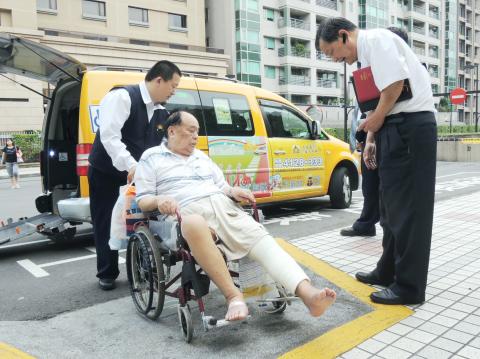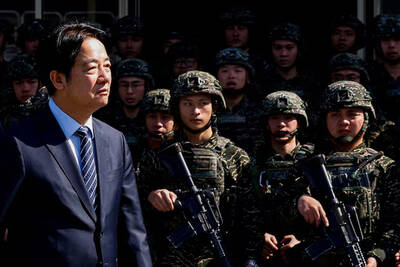During a typical workday on Friday, Chan Wei-sheng (詹惟勝) was driving his minivan taxi at 30kph through the city, taking care to slow down before stopping at red lights to avoid abrupt movements.
Chan was driving an elderly man who has to use a wheelchair because he has a cast on one leg. After he was released from hospital, the man’s family was worried about how he would get around, but fortunately, the Taipei City Government launched a wheelchair-accessible taxi service in February. In addition, the Ministry of Transportation and Communications is offering taxi drivers a subsidy of NT$400,000 (US$13,500) to buy wheelchair-friendly cabs.
While some cities offer the Fu-Kang Bus wheelchair-accessible service, it is only available to those who are officially registered as handicapped. By contrast, the wheelchair-accessible taxi service is available to anyone with a mobility problem — including temporary ones — and even to those who do not, Chan said.

Photo: Lin Hsiang-mei, Liberty Times
Currently, 10 wheelchair-accessible minivan taxis are in operation in Taipei. The difference between these cabs and regular ones is that the back seat has been modified to accommodate a wheelchair. The imported minivans feature a sliding door and a ramp that can be lowered from the trunk of the vehicle so passengers can board the taxi unassisted, eliminating the need to hold on to others or be carried when going in and out of the taxi.
The minivan taxis carry a price tag of about NT$1.6 million. The ministry’s subsidy is meant to cover some of this expense, but drivers must pay the rest, meaning that Chan had to take out a loan of more than NT$1 million to set up his service.
However, Chan and fellow driver Chiang Shu-sheng (姜書生) say they incurred the debt willingly because it enables them to provide a worthwhile service.
Chiang used to own a business, but had to declare bankruptcy after he was defrauded by clients and had his house repossessed by the bank.
The 55-year-old Chiang said he took up taxi driving because “it is a low-risk enterprise where you are paid in cash.”
After driving a cab for two years, he worked as a real-estate agent, and drove city and a tourist buses before eventually returning to taxis.
“The second time around, I decided to treat my taxi like a storefront. I refurbished it, added leather upholstery and am planning to install a karaoke machine in it,” he said.
Though Chiang joked that his sole motivation to offer the wheelchair service was the NT$400,000 government subsidy, he said the real reason was a personal one.
Eight years ago, Chiang’s 85-year-old foster mother had to have her legs amputated due to diabetes. Whenever she had go to the hospital or to the bank, she had to depend on Chiang to carry her between the vehicle and her chair.
After realizing that she was very uncomfortable about having to depend on him, Chiang was searching fervently for a solution when he saw an advertisement for the wheelchair-accessible taxi service.
“The most important thing for me is that my mother can ride in the car comfortably and with dignity,” he said. “My foster parents raised me and I owe them a lifetime of gratitude. I want to take care of them in their old age.”
For Chan, the inspiration to offer a cab service catering to the handicapped was his children.
His son, now a second-grader, contracted a high fever when he was just four months old and was subsequently diagnosed with Kawasaki syndrome, an autoimmune disease affecting the lymph nodes, skin and blood vessels.
Chan’s family lived in constant fear of the boy’s death until he passed the age of two without experiencing the fatal coronary artery problems associated with the disease. However, he has begun to show signs of slow mental development, Chan said.
His six-year-old daughter is also exhibiting developmental problems, as she has speech difficulties and is displaying autistic tendencies, he added.
Chan said these experiences have made him more attuned to those with special needs.
“In the past, when I drove a regular taxi, I only thought of transporting passengers to their destination. Now, I am much more aware of the needs of passengers with mobility problems,” he said. “For example, I never drive faster than 40kph, I make sure never to brake suddenly and I take corners very slowly.”
Chan said driving a wheelchair-accessible cab was more rewarding than driving a regular one because he got to help those in need.
He recounted how on Tomb Sweeping Day this year, he had taken a paralyzed man who had suffered a spinal cord injury to worship at his family’s graves, which the man had not done for more than 10 years because of a lack of transportation.
The man’s family filmed him getting in and out of Chan’s taxi in his wheelchair and posted the video online, prompting a big surge in customers seeking to hire Chan and his fellow drivers.
Chan said most of his passengers are respectful and friendly, often engaging him in conversation. By contrast, when he drove a regular cab he said he often met rude passengers who smoked, chewed betel nuts, or drunkenly shouted abuse at him.
“In the past, passengers came in and went out without any interaction. Now, I feel ‘needed.’ When elderly passengers thank me for my service, the feeling of happiness I get lasts for a long time,” he said.
“Handicapped people pay taxes just like everyone else. However, the government does very little for them,” Chan said.
Despite having had to pay off the loan for five years, Chan said it had been well worth it.
“At times, I work up to 15 hours a day, but I have a steady stream of customers. Normally, I work until about 10 or 11pm, then I go home,” he said. “Providing this service is healthier for me than driving a regular cab, but more importantly, it gives me a sense of satisfaction and purpose.”

The Taipei Mass Rapid Transit (MRT) Wanda-Zhonghe Line is 81.7 percent complete, with public opening targeted for the end of 2027, New Taipei City Mayor Hou You-yi (侯友宜) said today. Surrounding roads are to be open to the public by the end of next year, Hou said during an inspection of construction progress. The 9.5km line, featuring nine underground stations and one depot, is expected to connect Chiang Kai-shek Memorial Hall Station to Chukuang Station in New Taipei City’s Jhonghe District (中和). All 18 tunnels for the line are complete, while the main structures of the stations and depot are mostly finished, he

The first global hotel Keys Selection by the Michelin Guide includes four hotels in Taiwan, Michelin announced yesterday. All four received the “Michelin One Key,” indicating guests are to experience a “very special stay” at any of the locations as the establishments are “a true gem with personality. Service always goes the extra mile, and the hotel provides much more than others in its price range.” Of the four hotels, three are located in Taipei and one in Taichung. In Taipei, the One Key accolades were awarded to the Capella Taipei, Kimpton Da An Taipei and Mandarin Oriental Taipei. Capella Taipei was described by

Minister of Economic Affairs Kung Ming-hsin (龔明鑫) yesterday said that private-sector refiners are willing to stop buying Russian naphtha should the EU ask them to, after a group of non-governmental organizations, including the Centre for Research on Energy and Clean Air (CREA), criticized the nation’s continued business with the country. While Taiwan joined the US and its Western allies in putting broad sanctions on Russia after it invaded Ukraine in 2022, it did not explicitly ban imports of naphtha, a major hard-currency earner for Russia. While state-owned firms stopped importing Russian oil in 2023, there is no restriction on private companies to

President William Lai (賴清德) is expected to announce a new advanced “all-domain” air defense system to better defend against China when he gives his keynote national day speech today, four sources familiar with the matter said. Taiwan is ramping up defense spending and modernizing its armed forces, but faces a China that has a far larger military and is adding its own advanced new weapons such as stealth fighter jets, aircraft carriers and a huge array of missiles. Lai is expected to announce the air defense system dubbed “Taiwan Dome” in his speech this morning, one of the sources said. The system